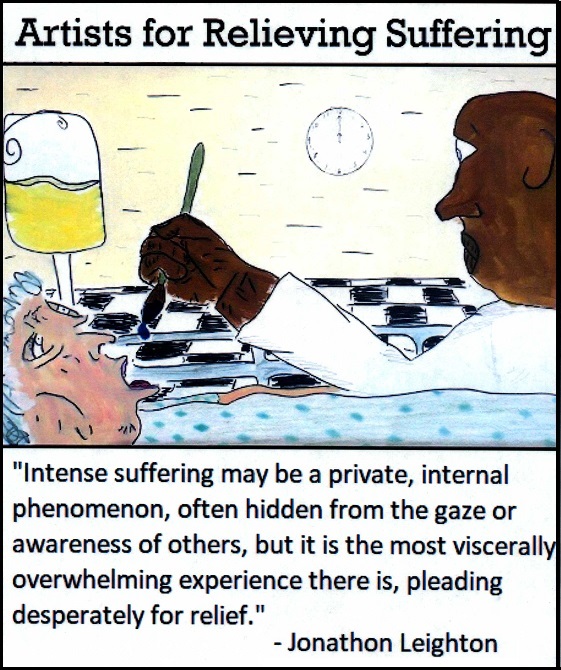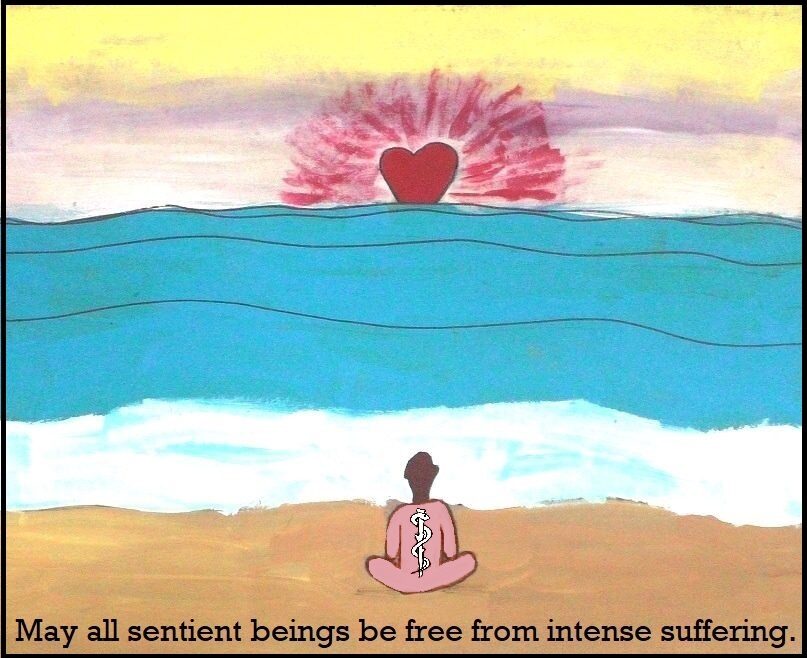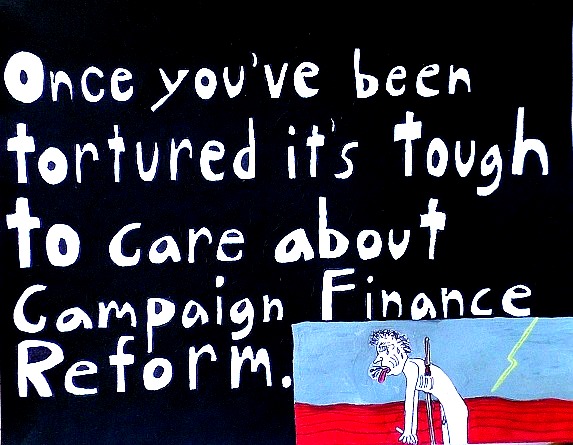About
In response to the immense suffering in this world, we should not walk away from Omelas, but should stay and fight for a world with less suffering and more Love.
This website expresses an unconditional love for all sentient beings, and the desire to see their suffering alleviated. This desire stems from the tidal-wave of compassion I experience while in happy states of mind: e.g. while meditating, listening to music, or in the breathless throes of laughter. I’ve experienced these moments of time-stopping ecstasy, in which nothing seems important but the well-being and freedom-from-pain of all sentient beings. In these moments my axiological focus narrows dramatically: everyone in the world become my sisters and brothers, and I wish for nothing less than their utter happiness. In the afterglow of this powerful experience I vow to be an agent for healing in the world, a vehicle for reducing suffering.

In this compassionate mind-state I feel like a Bodhisattva Caregiver, wandering the landscape of the sentio-sphere (the set of beings who have experiences) seeking to heal the sick, bandage the wounded, cradle all suffering beings in a compassionate embrace; I want to hug the lonely, feed the hungry, let the anxious and depressed know that they are never alone, sooth the chronic pain of millions, make sure all have access to end-of-life analgesics, rescue the billions of animals suffering on factory farms, protect the innumerable wild animals from predation and starvation, and prevent any future catastrophic suffering.
A Suffering-focused Love Ethic
I see normative ethics as about reducing suffering through love and caring; a combination of Suffering-focused Ethics and a Love Ethic. I agree with Lukas Gloor that ethics is about “solving the world’s problems: We confront spacetime, see wherever there is or will be a problem, i.e. a struggling being, and we solve it.”1 And I also believe that caring for and about others is the most meaningful activity a person can engage in, which can help create the loving connection we need to “organize the alleviation of suffering, steadily and sustainably.”2
How to Reduce Suffering
I am a regular, working-class person and artist who thinks it is important to try to make the world the best (least bad) place it can be by advocating for, caring for, and reducing the suffering of all sentient beings, particularly the most vulnerable(like the developmentally disabled) and those enduring the most intense suffering(like those suffering from cluster headaches).
Some things we can do today to reduce suffering globally are:
- Improve global human well-being/reduce global poverty by instituting Global Basic Income, enforcing International Labor Standards, and enacting Universal Health Coverage.
- End Factory Farming
- Ensure adequate global access to Pain Relief and Palliative Care
- End Torture
- End Modern Slavery
- Address systemic Global Racism
- Research ways to prevent Wild Animal Suffering
- Expand the Moral Circle/Research which beings are sentient in the world
- Promote a Suffering-focused Love Ethic
- Research ways to prevent or mitigate future astronomical suffering(s-risks)
Organizations working on these problems are:
- Algosphere Alliance
- Organization for the Prevention of Intense Suffering(OPIS)
- SAbo-Suffering Abolitionism
- Center for Reducing Suffering
- Center on Long-Term Risk
- The Neuroethics Foundation
- International Association for Hospice & Palliative Care
- Human Rights Watch
- The World Organization Against Torture
- Anti-Slavery International
- World Food Programme
- Animal Charity Evaluators
- Animal Ethics
- Wild Animal Initiative
- Sentience Institute
- The Life You Can Save
Why Focus on Reducing Suffering?
“I feel the suffering of millions.”
– Anne Frank
I think that pleasure(well-being) is very valuable! It inspires people to care about each other and fosters a sense of loving community; for example, I used to work at a school for children with disabilities. An 8 year old non-verbal girl would come up to me smiling on the playground and sign “more”, meaning she wanted me to push her more on the swing, even if I wasn’t working in her class that day! Her smile made me so happy; the whole world just disappeared when she did that, and in that moment I would wish that all children, all people, every sentient creature imaginable, crawling, rolling, walking, slithering, all the people I’d ever known and people I’d imagine coming to know, every lonely, elderly person I’d ever worked for, listening for hours to their recollections of the 1930’s, every person with disabilities I’d spent lazy Saturday afternoons with, drinking coffee in town, and every person with mental illness I’d seen in hospital struggling to maintain their dignity under the most difficult circumstances–I would wish them all uncontainable happiness, for all time.
When I reflect on these feelings of universal love and then contemplate how to implement them in the world, I realize how many people are suffering, and I think to myself, ‘suffering should be reduced before making happy people happier.’ I think that intense suffering itself is so experientially bad that in retrospect a universe with no sentience would have been preferable to one with it. With that being said, we should not “walk away from Omelas“, but should stay and fight for a better world, with less suffering and more compassion. By working together to relieve intense suffering for all sentient beings, guided by a sense of loving-care towards those closest to us and to the world at large, we can build a more beautiful world, filled with the joy of community, protecting the most vulnerable from the scourge of pain.
Citations:
- Gloor, Lukas. “The Case for Suffering-Focused Ethics”. Center on Long-Term Risk, https://longtermrisk.org/the-case-for-suffering-focused-ethics/#:~:text=Suffering%2Dfocused%20ethics%20is%20an,reducing%20suffering%20also%20matter%20morally. Accessed June 29 2022.
- Daoust, Robert. “Vision”. Algosphere Alliance, https://algosphere.org/about/vision/. Accessed June 29 2022.
- Effective Altruism Foundation. “About Us”. Effective Altruism Foundation, https://ea-foundation.org/about-us/. Accessed 16 September 2019..
Images used:
- Collins, Matthew. Intense Suffering. 2022. Albany, NY.
- Collins, Matthew. Artists for Relieving Suffering. 2022. Albany, NY.
- Collins, Matthew. Campaign Finance Reform. 2019. Albany, NY.
Music credit:
Saint-Saens, Camille. Sonata for bassoon with piano accompaniment (opus 168. Arthur Grossman, bassoon and Joseph Levine, piano play. Composed in 1921, performed in October 1978. https://commons.wikimedia.org/wiki/File:Camille_Saint-Saens_-_Sonata_for_bassoon_with_piano_accompaniment_(opus_168).ogg

